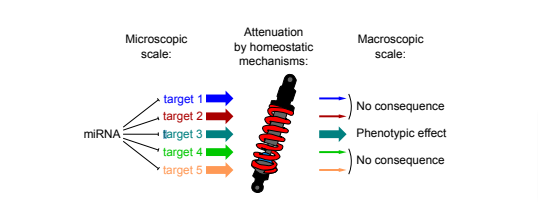Project : Gene regulation vs. homeostasis : the microRNA case
Gene regulation and homeostasis are two universal principles in the living world. Each one has been well studied, and current analysis methods (high-throughput molecular biology, bio-informatics, genome editing) allowed major advances in their understanding. But they have never been analyzed from the same perspective, even though they exhibit an intrinsic antagonism : gene regulation tends to alter the response of biological systems, while homeostatic mechanisms tend to give them inertia. Unexpected characteristics appear to emerge from their confrontation.
This PhD project deals with the antagonism between homeostasis and one mode of gene regulation : repression by microRNAs. These regulatory RNAs repress their targets to a very small extent (less than 2-fold), while interacting with many targets (a few hundreds of targets per mammalian microRNA). Current target identification methods (based on molecular biology and bio-informatics) tend to neglect that quantitative aspect. The PhD project aims at measuring the amplitude of homeostatic attenuation, and of microRNA-guided regulation, on a simplified system (cultured cells), in order to identify targets whose regulation survives homeostatic attenuation, and is transmitted from the microscopic to the mesoscopic scale. Identified interactions will then be tested in vivo in Drosophila, to evaluate their transmission till the macroscopic scale (hence : we will identify microRNA/target interactions which are responsible for biological phenotypes controlled by these microRNAs).

Skills
- Molecular biology (plasmid construction, RNA abundance measurement, ...)
- Cell culture (genome editing, cytometry, ...)
- Bio-informatics (motif search, phylogenetic analyses, ...)
- In vivo genetics (Drosophila genetics, knowledge in physiology, ...)
Completely mastering these techniques will not be required at the onset of the PhD project (the studen will be trained during the graduate years), but a sincere interest in molecular genetics and mathematical and computational analyses of biological processes will be necessary.

